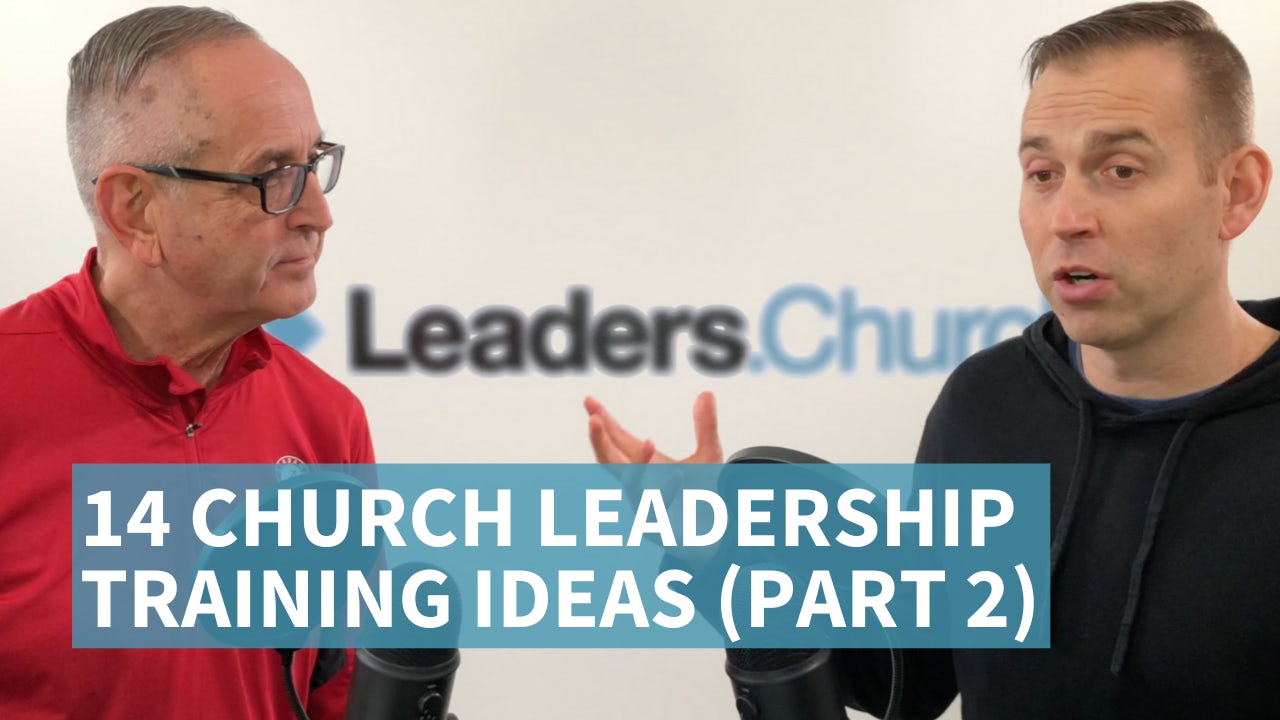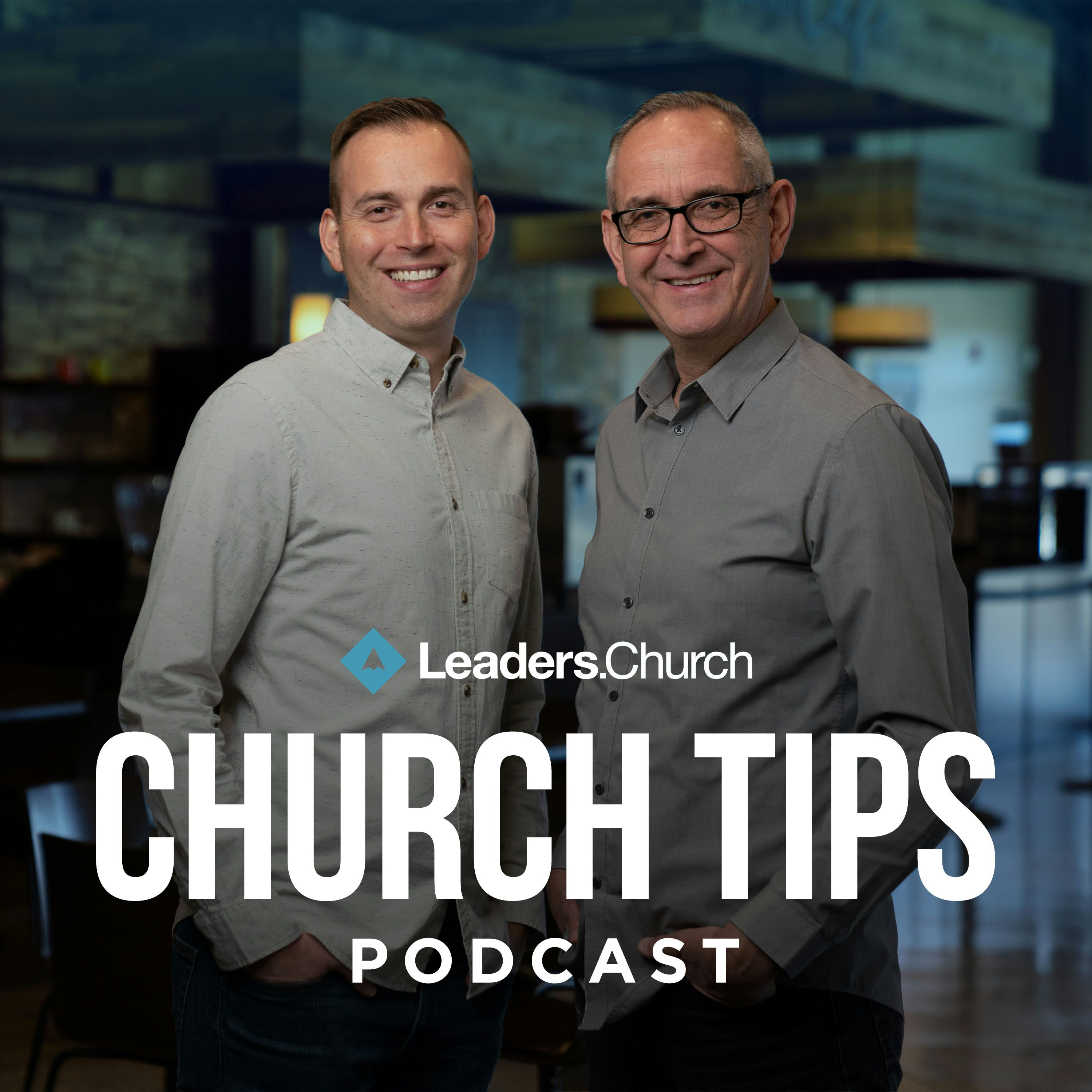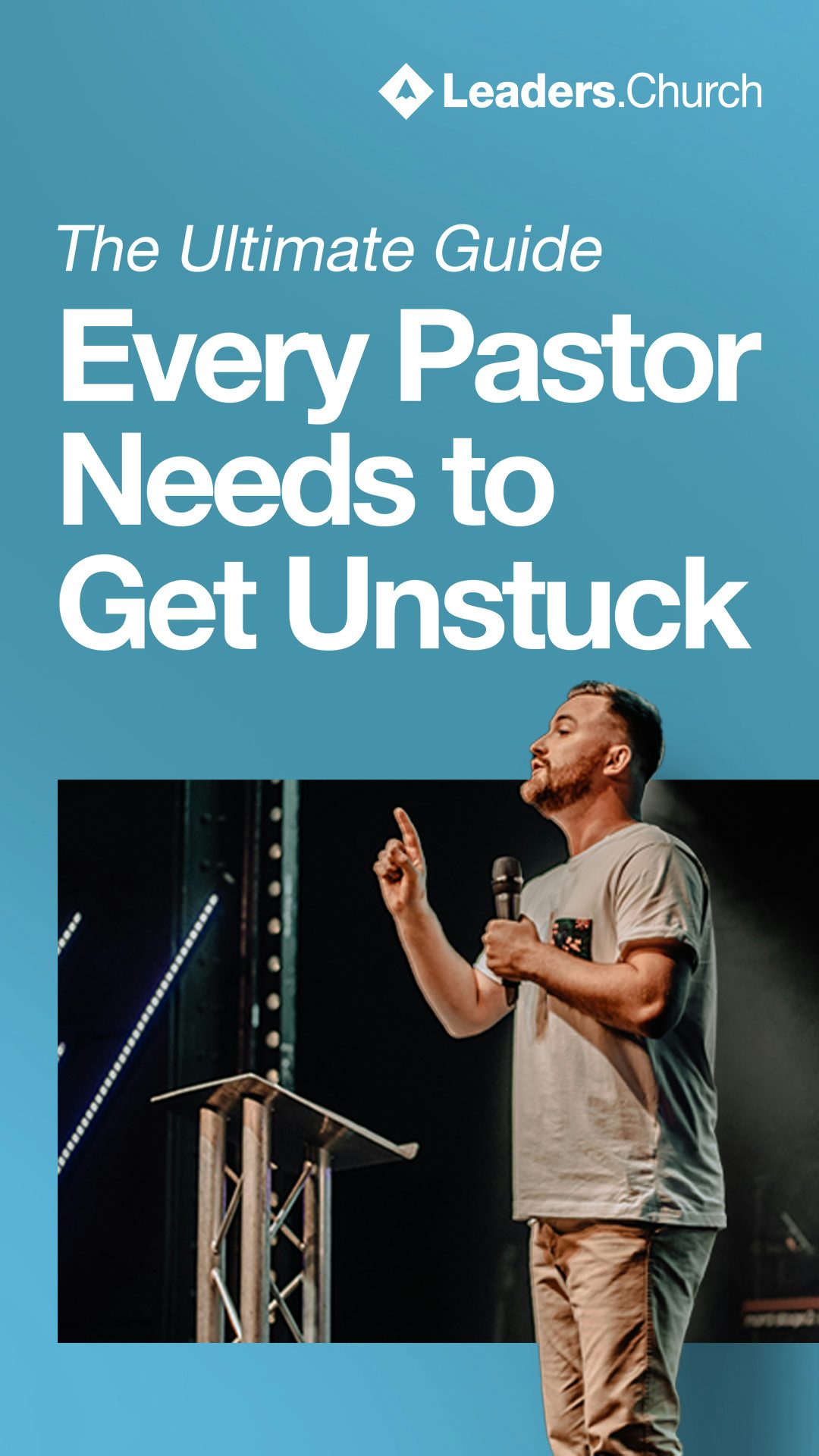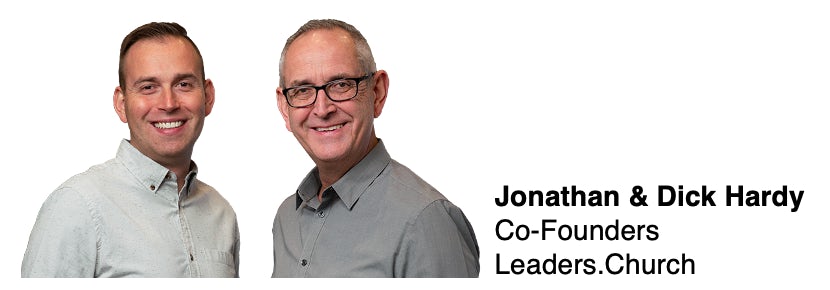010 – 14 Church Leadership Training Ideas (Part 2)
What’s in this Episode?
Have you ever gone to a meeting where someone allegedly said they would train you to be part of some big thing, only to waste your time with stuff they could have easily communicated to you by email. The truth is, your time is worth something, and so is every volunteer’s time. That’s why in today’s episode, we’re going to continue our discussion of how to conduct a successful church leadership training, meeting, and event that values people’s time and that they actually want to be part of.
Read the Transcript
Jonathan Hardy 0:34
So I was at this meeting the other day with a bunch of pastors and I look around the room and what did I see? I saw a bunch of people with their heads down looking at their phones. And I thought to myself, why are these people even at this meeting right now? Have you ever seen something like that? I mean, the fact is, it happens more times than we like.
Dick Hardy 0:50
Come on, they’re taking notes!
Jonathan Hardy 0:51
Well, you would think that they’re taking notes and some might, give some the benefit of the doubt, but we know that some were checking Facebook, some were looking at the sports score.
Dick Hardy 0:58
You wouldn’t do that.
Jonathan Hardy 0:59
Some were reading the news, maybe guilty of that, yes, I would possibly be guilty. Because that’s what happens when a meeting is not engaging. And we’re talking about church leadership trainings in this episode today. And we covered that in the previous episode. And we want to look specifically at 14 total church leadership training ideas to help you as you train the people in your church, how to make them the best they can possibly be. And in the previous episode, we covered five that I want to just recap with you here. And if you haven’t listened to that episode, it’s episode number nine. Be sure to check that one out. But, you tell people what you’re going to talk about. Second thing you do is you describe what you want people to take away from the meeting. The third thing is you want to review what you talked about at the end of your meeting. So those are kind of the big overview. Then you get into the details. You want to explain visuals before you show visuals and you want to have food at your training. So those are some practical tips and we’re going to continue with more practical tips today. And a lot of things we’re going to cover today, Dick, are really about engaging and, you know, so that you don’t have this meeting where everyone’s looking down at their phone. Instead, you have people that are making eye contact, they’re engaged, they’re enjoying their time at the training. And that’s something that I think everyone listening hopefully or watching wants to do for their training events, is they want them to be engaging. So let’s talk about that. How can we make these things engaging?
Idea #6: Keep It Simple
Dick Hardy 2:22
Well, the very first thing to do is to keep it simple. I mean, there’s no need at all to take something that’s simple, and try to make it complex. I mean, people aren’t stupid. They know if it’s a simple task or a simple piece of training and ministry. Communicate it simple. Now, if it’s complex or has some complexity to it, it’s your role as a leader to help make that complex thing feel more simple, because you have to have people understanding what you’re doing. So simple, keep it simple. If it’s complex, help it feel simple.
Idea #7: Roleplay As Much As You Can
Jonathan Hardy 2:59
Make it simple. Good. Okay. Second thing is to roleplay as much as you can. One of the cool things about meetings in person is the ability to roleplay. And we don’t often think about that in church leadership meetings, at least I don’t know that people do this. But I think if you can, it’s important to because it gives people a visual for what you’re talking about. And so whether you’re dealing with a specific type of training of a specific ministry, or whether it’s just kind of broad strokes overall, anytime you can get people up there together, maybe two, three people say, hey, I need a few volunteers get them up. It does a few things. One, the simple fact of asking people to stand up for those people, it causes them to stand up and it kind of re-engages their energy, but even those that are watching and listening, just a simple change of something you’re doing where they’re listening to this Monday and talking and all of a sudden, they say “okay, we need volunteers,” then everyone’s like, “oh, okay,” and it kind of re-centers people. And so even if the role playing now, hopefully it’s fun. Hopefully it’s helpful. But even if it doesn’t really do that much, simply doing it causes everyone to kind of reengage. And that’s something I think that’s really important.
Idea #8: Do Pop Quizzes
Dick Hardy 4:07
You know, one of the things… The third thing I want to throw by today is to do pop quizzes. Somebody’s going, Oh, pop quizzes. I hated those in school, but I’m not talking about something serious in the sense of, you know, they’re, you know, they’re going to keep their membership at the church or not. I’m talking about just doing something fun, surprise them. So, just as the role playing, pops energy into the meeting into the training, so does a pop quiz. And a pop quiz is maybe five things, four of which are things that you’ve covered that you wanted them to get and make sure by the way ahead of time, that they’ve got plenty of paper and pencil handy. So they write down their answers maybe the fifth thing is something goofy, like who’s whose birthday is closer today, yours or mine, you know, and they of course they don’t know yours and so they’re gonna guess blah, blah, blah. But then once you do it, then have some little cheesy prizes to give away, you know, give away a bag of microwave popcorn, give away some candy bars, give away some m&ms. Maybe everybody gets some m&ms, because they took the quiz. The whole point is, you might even throw in a few $5 gift cards. But the point is the pop quiz will help reinforce those three or four things that you really wanted them to remember. And then it does the energizing for the room.
Jonathan Hardy 5:27
And what I love about that is it’s subtle, you’re subtly wanting to re-emphasize or over-emphasize certain points that are really the key takeaways. I mean, if you boiled it down to your training to like four key takeaways, those are the pop quiz questions.
Dick Hardy 5:43
Exactly.
Jonathan Hardy 5:43
And then you make it fun with you know, candy or…
Dick Hardy 5:47
Somebody is a winner, or two or three people are winners.
Jonathan Hardy 5:49
Yeah. Or you do it as a table or whatever. And yeah, there’s so many different ways you can do that. But that’s a good creative idea.
Dick Hardy 5:55
Give us another one.
Idea #9: Be Interactive With Those That You’re Training
Jonathan Hardy 5:55
All right, number four. Be interactive with those that you’re training. Now, what I mean by that is simply not just in the role playing side of things, but really just even as your training overall, you know, if you have people sitting in rows, or if you have people sitting at tables, in round tables or something like that, whatever the context looks like, whenever you can be interacting with them, that helps keep people engaged, you know, you may say, “hey, Bob,” you know, ask them a question. And it could be a fun thing, just like you’re kind of just joking around. Or it could be a serious moment, like, “hey, Sue, I saw you do this, and when you were at the front doors, or whatever, I really appreciated how you did that.” And so you’re just interacting with people, when you interact with people like that it helps them to stay engaged, and to stay in tune with what you’re saying. And it keeps them feeling like they’re a part of this. It’s not just you up there speaking, and everyone’s just the listener. There’s more interaction happening that helps people just feel a part of this bigger thing. This mission called the church and reaching your community. And so, you know, you just want to interact with people as much as you can, as best as you can.
Dick Hardy 7:07
Exactly. You know, I’m going to insert something here, that’s not a part of our notes when you just referenced, you know, with people sitting at tables and so on. The more you can set your room up in a way that has round tables. Now, if you don’t have round tables, fine, but you want people sitting around things as opposed to a lecture room feeling. You’re going to get a better response from people if they can look. You’ll notice Jonathan and I are sitting here at an angle. So you know, if a table was filled with a couple, two or three other people, it we would be in a round. You’ll find better training happening if you’ll set that up. Not part of our notes here, but…
Jonathan Hardy 7:45
That’s just a little bonus for you. That’s four point B.
Idea #10: Say Questions Twice Before Giving The Answer Publicly
Dick Hardy 7:50
The fifth point is say questions twice before giving the answer publicly. Now, you’ve watched people do this, and sometimes you go, “why are they doing that,” you know, so, okay, so what’s the point of why we’re doing XYZ? So, okay, here it is. So what’s the point of why we’re doing XYZ? Well, the point is, and then you give the answer. If you’ll repeat the question, you do a couple things. One, you reinforce the importance of what the question is. And then you give people a chance to think for answers. Because if you’re literally asking the group, Bob responds over here, Mary responds over here, you give them a chance to think and respond in that way.
Jonathan Hardy 8:32
Yeah and not everyone is a quick start. You know, not everyone just immediately can think, yeah, I’m not. So it takes me time to think about, okay, the question is this, and I just need to process first, when some people they are, man, they can just fire off the answer immediately.
Dick Hardy 8:44
I fire off the answer whether I know it or not!
Jonathan Hardy 8:46
Yes you do. Might even be on a completely different subject!
Dick Hardy 8:50
But I’m good at that. But the whole point is you’ll help people and reinforce what you want to have done. So Jonathan, give us a recap. We’ve done those five.
Recap
Jonathan Hardy 8:59
Yeah, let’s recap these five plus the bonus one from Dick here. So we had keep it simple. Roleplay as much as possible. Number three: do pop quizzes. Number four: be interactive with those your training. And what was part B? Well, make it a round table or interactive setting. And then number five is say questions twice before giving the answer publicly. Now all of these are designed to give you church leadership training ideas, so when you’re in this training, you’re able to just give them… you’re just taking these nuggets and thoughts of, “how can I make a church leadership training?” Could be specific ministry training, whatever kind of training you’re doing, how can I make this environment and atmosphere helpful, the best it can be, engaging, especially is some of the stuff that we covered today.
Dick Hardy 9:46
Exactly. This is the middle episode of the three part series on these training tips, these training ideas. So be sure if you didn’t watch episode nine that you go back and take a look at that and stay tuned for Episode 11 coming up on the next go around. So we really appreciate having you here. I think this has been some great content. We hope you found it valuable. Anything to add to this, Jonathan?
Jonathan Hardy 10:13
Yeah, I just would encourage you if you haven’t yet taken the Five Day Leadership Challenge we want to encourage you to do so. This is a way for you to invest in yourself personally, on different areas of leadership over five days for 15 minutes a day, and in doing so, it’s going to help you lead better and really make your church be all that it can be or your ministry that you lead all that it can be.
Dick Hardy 10:34
And it’s free to you.
Jonathan Hardy 10:35
Yep,
Dick Hardy 10:35
Absolutely.
Jonathan Hardy 10:36
So, you go to Leaders.Church/challenge, and that’s where you can sign up and get started today. You could sign up today and today would be day one for you of the five days and you’ll be off and running. Also, we want to make sure if you haven’t yet subscribed, be sure to subscribe on whatever channel you’re watching or listening to this, whether it be YouTube or whether it be one of the podcast platforms. We want to make sure that you subscribe so that way you can get notified of all of the new content that’s coming out. And we’re just thankful that you joined us today. We look forward to talking to you next time until then, be blessed.
Subscribe & Follow:
- Subscribe on Apple Podcasts
- Follow on Spotify
- Subscribe to YouTube Channel
- Subscribe on Google Podcasts
- Like us on Facebook
- Follow us on Instagram
- Follow us on Twitter









